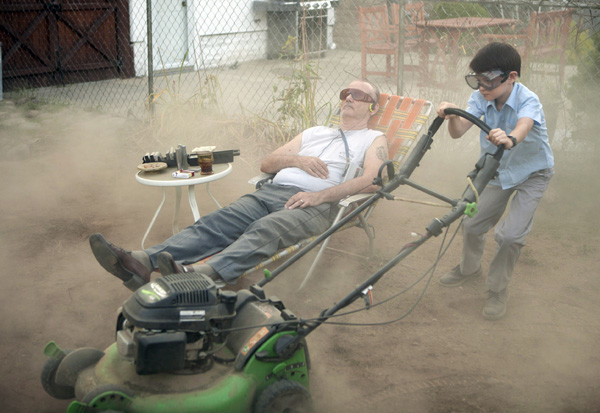Written and Directed by Theodore Melfi
Produced by Peter Chernin, Jenno Topping, Melfi and Fred Roos
Released by the Weinstein Company
USA. 102 min. Rated PG-13
With Bill Murray, Melissa McCarthy, Naomi Watts, Chris O’Dowd, Terrence Howard and Jaeden Lieberher
In the past five years or so, Bill Murray has seemingly gotten bigger and more popular than ever. But this has mostly been due to his delightful habit of showing up in the most unexpected places more than making an instant classic, beloved movie. He’s largely been locked into the joyless art house world of Jim Jarmusch and minor roles in the hyper-stylized twee world of Wes Anderson, with a few misfires like The Monuments Men and Hyde Park on Hudson thrown in. It’s been about 10 years since his resurgence with films like Lost in Translation and The Life Aquatic with Steve Zissou, but those weren’t mass appeal movies meant to tickle the bones of lots of people.
St. Vincent, the feature film debut of writer-director Theodore Melfi, is as close to a big, warm Bill Murray-driven ensemble dramedy as we’re likely to see. It isn’t Groundhog Day or What About Bob?, but it is very good, if a bit dragged down by the need to be gritty, grounded, and real. Can movies not just be fun anymore? When did grittiness become everyone’s favorite thing? Get ready to see Bill Murray go Full Senior Citizen, nursing his Alzheimer’s stricken wife and battling the crippling effects of a stroke.
Murray plays Vincent, a grizzled Vietnam vet with perpetual money problems, no charm, and no shame. There’s something especially sad about a man nearing 70 who has the money problems of a hard partying 24 year old. His only friends are the patrons of his local Brooklyn dive bar, who tolerate his alcoholism as long as it doesn’t impinge on their lives too much, and the very pregnant Eastern Bloc hooker/stripper Daka (a scene stealing Naomi Watts). Her other clients have all been turned off by her pregnancy. Not Vincent—he is down for whatever.
Always on the lookout for new cash flows, Vincent connives his way into a cushy $12/hour babysitting gig for Oliver (Jaeden Lieberher) , the 12-year-old who just moved next door, whose mom, Maggie (Melissa McCarthy), works late. This is a departure for McCarthy, who is quite funny in a sly, quiet way, and hopefully she will avoid charging around screaming and executing poop jokes for a few movies.
The film is bolstered by sticking great comic actors in marginal parts such as Chris O’Dowd as Oliver’s teacher, a consistently warm and funny presence. Newcomer Lieberher is solid as the excessively formal, timid Oliver who makes a believable transformation into a confident, risk-taking young man. Vincent’s benign neglect of him—feeding him sardines and crackers for dinner, taking him to the horse track—turns out to be just what Oliver needs to develop a sense of self.
There are plenty of whimsical montages set to Wilco where Vincent and Oliver discover warmth and confidence through each other’s company, interspersed with dancing and the fun Bill Murray flourishes that we want and need from this movie. But the comedy isn’t especially joke-centered, and there aren’t huge laughs. The story of a curmudgeon with a heart of gold letting a precocious kid open him up to the world isn’t especially surprising or new. It’s all about that one moment when the world finally lets Vincent know how decent he actually is behind his gruff exterior, and when that moment comes, the movie really works. St. Vincent is about a man who finally allows himself to admit that the ragtag group of folks around him is the only family he’s got, and that is a lot.
It’s hard to think of a more effective tearjerker this year, all the more surprising and effective because there are no manipulative Shailene Woodley–style illnesses. St. Vincent is a powerful little movie that will stay with you for a while, if you let it in. There’s a saying that family is more than just blood, and more than any movie in recent memory, St. Vincent points out how a group of people who rely on each other can become as close as any nuclear family.







Leave A Comment